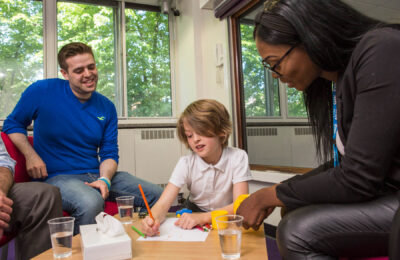
Child development research for professionals working with children, young people and families (CPD28)
Join our experts for an introduction to the latest findings in child development research
Many experienced professionals working in health, education and social services settings can feel perplexed when faced with emotional, behavioural and developmental difficulties in young children.
In such instances, findings from child development research can provide support. With developments emerging from many fields – such as attachment theory and neuroscience – this area can provide new insights and a greater awareness of the impact of early experiences on children’s development.
This CPD course takes the child development research module of our established Postgraduate Certificate course in Child, adolescent and family mental well-being multidisciplinary practice (D24). Delivered in-person at The Tavistock Centre, it provides an opportunity for professionals working with children, adolescents and young people to update their skills and knowledge in this area.
Aims and learning objectives
Throughout this course, you will develop:
- a comprehensive grasp of the scope of developmental science research, through critical reading and discussion, and a systematic understanding of current topics most relevant to the subject
- the ability to critically appraise issues of ‘normative’ development and how cultural issues affect our understanding of development
- an understanding that empirical developmental research involves the slow building-up of knowledge and an openness to new findings which will elaborate, question or even contradict established knowledge
- a capacity to think critically about clinical research papers, the development of ideas, the social and political context influencing the development of these and across disciplines (e.g. neuroscience, attachment theory, developmental psychology and cultural understanding)
- the ability to make comparisons between different types of developmental research and differentiate between models of human development
- a capacity to identify appropriate interventions for dealing with complex problems that use learning about wide current understandings of developmental issues in understanding clients
- an understanding of the context, assumptions and methods of developmental research and the links between early developmental processes and later mental health issues
- the ability to independently (and with originality) evaluate the broad range of research presented to find the research which is pertinent to your work with clients
- an appreciation of how good science has a crucial role in clinical work with children, young people, adults and families
Who is this course for?
This course is suitable if you are interested or currently work in the field of child, adolescent, or family mental health and want to improve your knowledge base through an understanding of the latest developmental science research.
You might be working as a:
- counsellor
- psychotherapist
- social worker
- health visitor
- nurse
- doctor
- police officer
- child and adolescent primary mental healthcare worker
- education professional
- occupational therapist
- creative arts therapist
- child and adolescent mental health services (CAMHS) practitioner
Those working with children and families in other roles within the voluntary or statutory sector are also encouraged to join the course.
Course details
This course will be hosted in-person at the Tavistock Centre in London.
Teaching for this course will comprise a formal lecture, generally using audio visual material, with group discussion led by Graham Music, Associate Lecturer, and other visiting lecturers.
| Sessions | Date and Title | Start time | End time |
|---|---|---|---|
| Session 1/17 | Monday 30th September 2024 – Introduction to child development | 4.45pm | 5.45pm |
| Session 2/17 | Monday 7th October 2024 – Prenatal life | 4.45pm | 5.45pm |
| Session 3/17 | Monday 14th October 2024 – Primed to relate | 4.45pm | 5.45pm |
| Session 4/17 | Monday 4th November 2024 – Neurobiology and early development | 4.45pm | 5.45pm |
| Session 5/17 | Monday 11th November 2024 – Culture, diversity and developmental Issues | 4.45pm | 5.45pm |
| Session 6/17 | Monday 18th November 2024 – Early defenses in response to adverse experiences | 4.45pm | 5.45pm |
| Session 7/17 | Monday 25th November 2024 – Attachment theory | 4.45pm | 5.45pm |
| Session 8/17 | Monday 2nd December 2024 – Memory and internal representations of relationships | 4.45pm | 5.45pm |
| Session 9/17 | Monday 9th December 2024 – Empathy, and other minds | 4.45pm | 5.45pm |
| Session 10/17 | Monday 6th January 2025 – Play, creativity, flexibility | 4.45pm | 5.45pm |
| Session 11/17 | Monday 13th January 2025 – Language, symbols and words | 4.45pm | 5.45pm |
| Session 12/17 | Monday 20th January 2025 – Humans as a group species | 4.45pm | 5.45pm |
| Session 13/17 | Monday 27th January 2025 – Adolescence and early adulthood | 4.45pm | 5.45pm |
| Session 14/17 | Monday 3rd February 2025 – Gender, sexuality and the role of the father | 4.45pm | 5.45pm |
| Session 15/17 | Monday 10th February 2025 – Moral development | 4.45pm | 5.45pm |
| Session 16/17 | Monday 24th February 2025 – Maltreatment and resilience | 4.45pm | 5.45pm |
| Session 17/17 | Monday 3rd March 2025 – Long-term effects | 4.45pm | 5.45pm |
The programme for this course is split into three parts:
Part one
You will be introduced to key ideas emerging from child development research. Topics covered will include prenatal life and birth, early mother-infant interactions, an infant’s preconceptions of relationships, cultural influences on development, attachment neuroscience and the impact of early experience on brain development.
Part two
You will hear about the impact of disruption in early parent-infant interaction, how memories and representations of relationships form, as well as gender development, the role of fathers and the development of language and play.
Part three
You will learn about the development of a child as a social being, the place of non-maternal childcare, the influence of peers and siblings, adolescent development and the long-term effects of early experience.
Library membership
Included in your course fee, you will receive online membership to the Tavistock’s internationally-renowned library for the duration of your course.
Our friendly and knowledgeable library team will help to support you through your specialist CPD course, whatever your level of professional or academic experience. You will have access to an extensive range of eBooks, online journals, all the relevant key databases and our specialist audio-visual collection, plus reference access to all our print books.
Our Information Skills Trainer has made lots of material available on Moodle to help you navigate our comprehensive electronic collections. PCs and photocopiers are available for your use (charges apply for printing and copying), as well as various online resources including audio/video playlists. Find out more.
Course facilitators
Book your place today
You can book a place at any time. You’ll receive confirmation by email, and we will be in touch approximately one week before the course starts with detailed joining instructions.
 Postgraduate certificate
Postgraduate certificate 
 CPD certificate
CPD certificate 